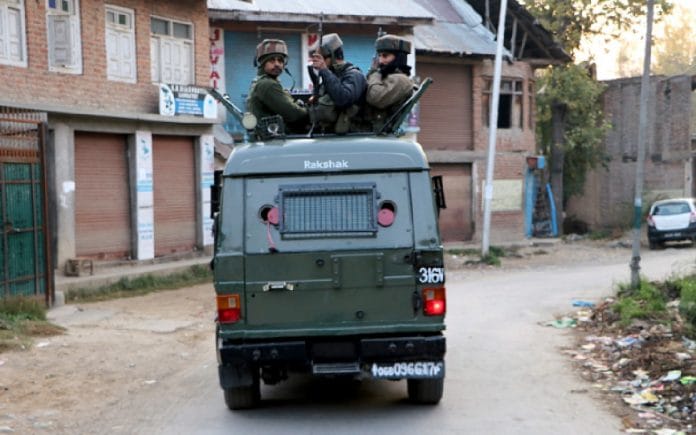New Delhi: The Army has put its summer strategy in place along the Line of Control (LoC) with Pakistan even as security agencies expect terror activities to increase during the approaching summer in Kashmir.
The measures include grid-wise force multipliers at the LoC.
The move also comes on the back of the terror attacks claimed by The Resistance Front (TRF), which security agencies believe is yet another proxy group launched by Pakistan.
Sources in the security agencies said the TRF is nothing but a front for Islamabad to give terror attacks an indigenous spin and attract local recruits.
“Pakistan has already cranked up the supply tap (infiltration of terrorists) at the LoC. The ceasefire violations are for that only,” a source in the security establishment told ThePrint, adding terrorists in the Valley will also increase their activities that currently focus on soft targets like policemen on patrol or those at checkpoints.
“We expect this to go up in the coming weeks,” the source said, and added that the security forces are already on the offensive even as precautions are being taken in view of the coronavirus pandemic.
Also read: Effect of surgical and Balakot strikes gone. Piecemeal policies against Pakistan won’t work
Army shifts to summer strategy
A senior Army officer said the force has shifted to its summer strategy under which there is greater deployment of troops along the LoC to ensure the infiltration attempts are thwarted.
The strategy involves multiple grid-based security and deployment of more lethal and detection-based systems.
On 5 April, five terrorists were killed in an operation along the LoC in North Kashmir’s Kupwara district after they infiltrated from Pakistan. Five commandos of the Army were also killed in action.
Lt Gen B.S. Raju, the general officer commanding of Srinagar-based 15 Corps, had said then the incident clearly showed the complicity of Pakistan in aiding and abetting infiltration and, as a consequence, terrorism in the Valley.
“This act of Pakistan is especially reprehensible because when the whole world is fighting Covid-19 and its aftermath, here is Pakistan aiding and abetting infiltration,” he had said.
Also read: What is Shekatkar report, defence ministry’s first order of business after lockdown
Ceasefire violations by Pakistan increase
While ceasefire violations are a regular feature, sources said what is surprising is that it has increased despite the Covid-19 pandemic being a major issue in Pakistan and the country’s army having been deployed to contain it.
There have been at least 1,197 ceasefire violations by the Pakistani Army this year — as many as 411 of them in March. The number of violations was 267 in March last year, the sources said.
According to official figures, Pakistani troops resorted to 3,200 instances of ceasefire violations in Jammu and Kashmir in 2019, which was the highest in the last 16 years.
The Army is responding to the ceasefire violations in a calibrated manner. Defence Minister Rajnath Singh, in an interview to news agency PTI, said the Indian Army is carrying out “targeted strikes” on terror launch pads along the LoC.
While there are no official estimates of casualties on the Pakistani side, sources in the Army said there have been several fatal and non-fatal casualties on the other side.
“If you go by average figures, I would say that there is at least one fatal casualty every week on the Pakistani side and several 3-5 non fatal casualties because of our response,” a senior Army officer said.
These numbers are based on the intercepts and human intelligence on the ground.
Also read: 50 military hospitals prepared for Covid-19, 6 viral testing labs up and running
Agencies keep close watch on TRF
Both the Army and the security agencies are keeping a close watch on the TRF. The group first surfaced in October last year when it claimed responsibility for a grenade attack on CRPF personnel.
In March this year, the Jammu and Kashmir Police busted a module of TRF, also known as the JK Fighters.
While initially it was suspected to be an offshoot of the Pakistan-based Lashkar-e-Taiba, central security agency sources said they believe it to be yet another proxy of Pakistan to claim attacks done by other organisations.
The module had even claimed that the five terrorists killed in an operation in Kupwara earlier this month belong to them.
“The TRF is yet another attempt by Pakistan to give a indigenous spin to what happens in Kashmir. They are claiming attacks done by others. They are also being used to attract local recruits,” a source told ThePrint.
On Sunday, the TRF claimed responsibility for an attack in Anantnag in which a policeman from Jammu and Kashmir Police was killed.
However, on Monday issued a fresh statement denying the attack saying they don’t kill Kashmiris. It went a step ahead and blamed the attack on theHizbul Mujahideen and warned the terror group against any such attacks.
Security forces say that the attempt is to attract local recruits and there would be cases in future when there could be direct attacks by the TRF as the numbers increase.
Also read:Coronavirus hits Rafale deliveries to India, first four fighters expected in July, not May
False flag operation concerns
There are also fears in some corners that Pakistan, which has been running a “false flag operation by India”, could actually carry out some kind of attack and blame it on Indian agencies.
The recent Kandla port incident involving a Chinese ship was also categorised as a false flag operation of India.
According to an intelligence input, it was by a think-tank in Pakistan that had organised a seminar on “Radical” India and “Responsible” Pakistan recently.
Sources said that Pakistan has been talking about false flag operations by India, which could come handy when next terror strikes here.
However, there are no specific intelligence inputs regarding any major terror attack.
Also read: Navy remains ‘combat-ready’ after 26 sailors test positive for Covid-19






